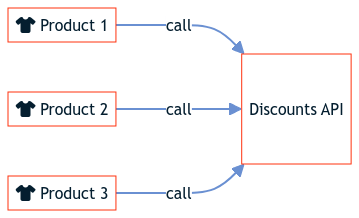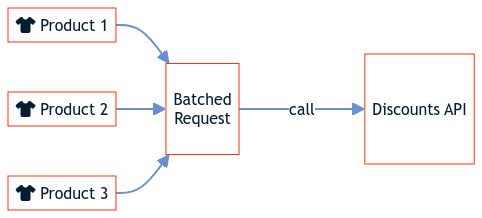Batching with API Mesh for Adobe Developer App Builder
Batching allows you to combine a group of requests into a single request, turning multiple queries into a single one. Compared to sending multiple queries simultaneously, batched requests result in better response times. They also avoid issues with rate-limiting.
Batching is only possible if the APIs included in your mesh support batching.
The following graphics depict the difference between queries with batched and unbatched calls:
Unbatched
If your sources do not support batching, each query runs separately.

Batched
If your sources support batching, and you batch with declarative or programmatic resolvers, multiple queries combine to form a single request.

The n+1 problem
The n+1 problem occurs when you request multiple pieces of information that cause the system to make multiple (n) queries to a source instead of using a single query. Since each query takes approximately the same amount of time, processing many queries can lead to degraded performance. In this example, a Reviews API contains reviews of your products by SKU. Without batching, you would need to query each SKU individually to return the corresponding reviews.
Example (without batching)
Consider a scenario where you are using the following mesh, where the Reviews source is a third-party API that contains reviews for your products by SKU. Each review consists of a review, customer_name, and rating field.
Copied to your clipboard{"meshConfig": {"sources": [{"name": "Products","handler": {"graphql": {"endpoint": "https://venia.magento.com/graphql"}}},{"name": "Reviews","handler": {"graphql": {"endpoint": "<Reviews_API_URL>","useGETForQueries": true}}}],"additionalTypeDefs": "extend type ConfigurableProduct { customer_reviews: [productReviewslist]} ","additionalResolvers": [{"targetFieldName": "customer_reviews","targetTypeName": "ConfigurableProduct","sourceName": "Reviews","sourceTypeName": "Query","sourceFieldName": "productsReviews","requiredSelectionSet": "{ sku }","sourceArgs": {"sku": "{root.sku}"}}],"responseConfig": {"includeHTTPDetails": true}}}
Use "includeHTTPDetails": true to see response details that indicate how many calls your mesh made to each source.
The custom resolver extends the type ConfigurableProduct with a new customer_reviews field, which allows nesting review fields inside of queries against the Venia source. The resolver is composed of the following components:
- The target (
targetTypeName,targetFieldName) - describes the queried field. - The source (
sourceName,sourceTypeName,sourceFieldName) - describes where the data is resolved for the target field. requiredSelectionSetfetches the required arguments.sourceArgsmaps therequiredSelectionSetargument to the source.
Use "includeHTTPDetails": true to see response details that indicate how many calls your mesh made to each source.
The following query causes multiple calls to the Reviews API:
Copied to your clipboard{products(filter: { sku: { in: ["VD03", "VT12"] } }) {items {... on ConfigurableProduct {skunamecustomer_reviews {skureviews {reviewcustomer_namerating}}__typename}}}}
Batching with declarative resolvers
The following example explains how to use batching inside your mesh configuration file by using declarative resolvers.
The Reviews source takes an array of product SKUs and returns an array of reviews for each SKU. To make a single network request to the Reviews source for multiple SKUs, add keysArg and keyField to your mesh.
Request batching using API Mesh requires a source endpoint capable of processing an array of values.
Copied to your clipboard{"meshConfig": {"sources": [{"name": "Products","handler": {"graphql": {"endpoint": " https://venia.magento.com/graphql"}}},{"name": "Reviews","handler": {"graphql": {"endpoint": "<Reviews_API_URL>","useGETForQueries": true}}}],"additionalTypeDefs": "extend type ConfigurableProduct { customer_reviews: productReviewslist} ","additionalResolvers": [{"targetFieldName": "customer_reviews","targetTypeName": "ConfigurableProduct","sourceName": "Reviews","sourceTypeName": "Query","sourceFieldName": "productsReviews","keysArg": "sku","keyField": "sku"}],"responseConfig": {"includeHTTPDetails": true}}}
requiredSelectionSet and sourceArgs are replaced with keysarg and keyField:
keysArgprovides the name of the primary key argument. For this example, thekeysArgfield is the argument name used when sending an array of SKUs to fetch multiple reviews.keyFieldprovides the key value for each item in the batched query. For this example, thekeyFieldindicates which Product field provides the SKU value to the review service.
With the updated mesh, using the previous query returns the same information, but only makes one call to the Reviews source for multiple SKUs.
Batching with programmatic resolvers
The following example explains how to use batching inside your mesh configuration file by using programmatic resolvers.
In the following example, args.skus creates an array of SKUs to query instead of querying each SKU individually. The valuesFromResults object is optional and allows you to filter, sort, and transform your results.
In the following example, you would create your mesh configuration file (mesh.json) and the referenced JavaScript file (resolver.js) in the same directory.
The resolvers.js file contains similar logic to the additionalResolvers.js file in Programmatic Resolvers, but adds batching and logging.
mesh.jsonresolver.jsCopied to your clipboard{"meshConfig": {"sources": [{"name": "AdobeCommerce","handler": {"graphql": {"endpoint": "https://venia.magento.com/graphql"}}},{"name": "DiscountsAPI","handler": {"JsonSchema": {"baseUrl": "https://random-discounts-generator.apimesh-adobe-test.workers.dev","operations": [{"type": "Query","field": "discounts","path": "/getDiscounts?skus={args.skus}","method": "GET","requestSample": "https://random-discounts-generator.apimesh-adobe-test.workers.dev/getDiscounts?skus=[%27abc%27,%20%27xyz%27]","responseSample": "https://random-discounts-generator.apimesh-adobe-test.workers.dev/getDiscounts?skus=[%27abc%27,%20%27xyz%27]","argTypeMap": {"skus": {"type": "array"}}}]}}}],"additionalResolvers": ["./resolvers.js"]}}
Copied to your clipboardmodule.exports = {resolvers: {ConfigurableProduct: {special_price: {selectionSet:"{ name price_range { maximum_price { final_price { value } } } }",resolve: (root, args, context, info) => {return context.DiscountsAPI.Query.discounts({root,key: root.sku,argsFromKeys: (skus) => ({ skus }),valuesFromResults: (results) =>results.map(({ discount }) => discount),context,info,selectionSet: "{ sku discount }",}).then((discount) => {let max = 0;try {max = root.price_range.maximum_price.final_price.value;} catch (e) {max = 0;}if (discount) {return max * ((100 - discount) / 100);} else {return max;}}).catch((e) => {context.logger.error(e);return null;});},},},},};
Copied to your clipboard{products(filter: {sku: {in: ["VD03", "VT12"]}}) {items {nameskuspecial_priceprice_range {maximum_price {final_price {value}}}}}}
